Golden Leaves, Black Slime, and Ivory Robes
Reflections upon the Season 2 premiere of The Lord of the Rings: The Rings of Power
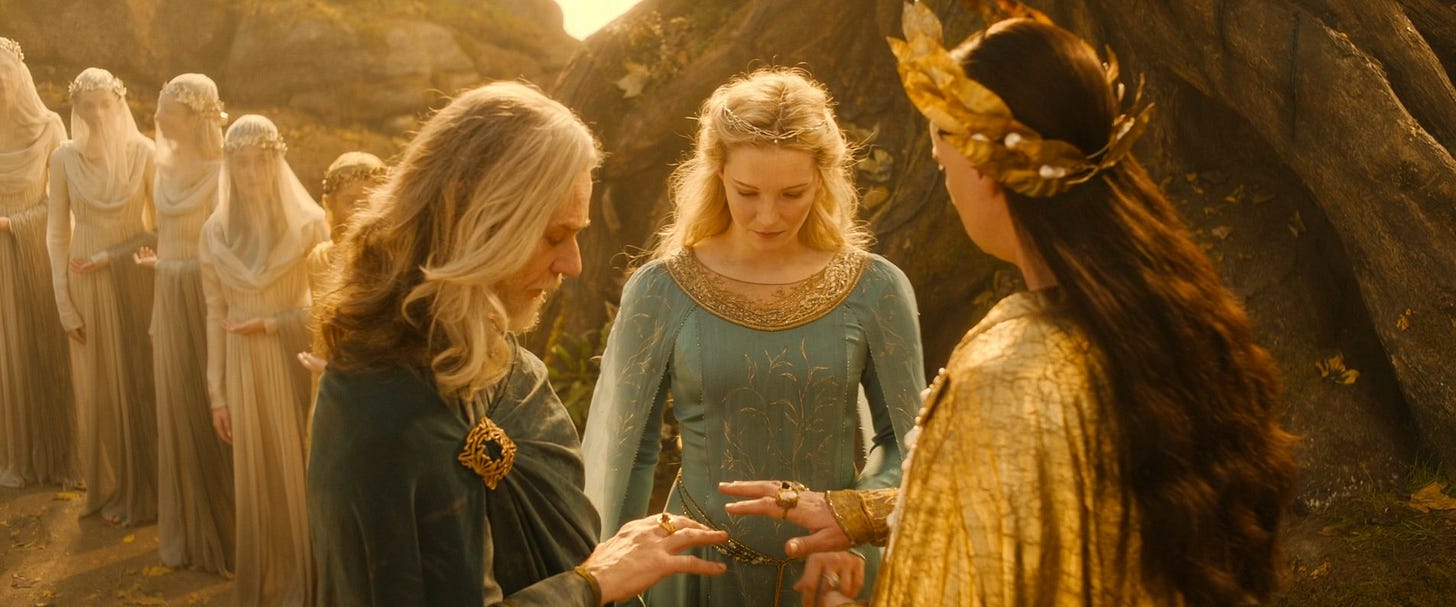
I had thought of starting with something eloquent and flowery and profound, as is sometimes my habit when it comes to writing my essays. But then I thought, why? Far better to let my subject matter be eloquent. And it’s subject matter that we have long awaited: namely, the second season of The Lord of the Rings: The Rings of Power, which finally premiered with three episodes on August 29. And it was met with near universal acclaim from everyone who wasn’t some culture-war berserker, lore purist, or Peter Jackson exclusivist; at one point the show had scored a whopping 92% and 65% on Rotten Tomatoes, from critics and audiences respectively (that second number is quite spectacular, given how the aforementioned culture war berserkers had tanked the first season’s audience score and, more recently, had done the same to Disney’s The Acolyte), and it’s numbers are still stronger than Season 1’s. Critics and fans have all spoken glowingly of the season’s acting (two performances in particular are all the rage), of how the production design is even better than season 1, of how the writing is on much more solid ground and doesn’t make as many rookie mistakes as last time, and how the story flows much better now that it has shifted beyond worldbuilding and into actual events that Tolkien wrote about in The Silmarillion and Unfinished Tales. But you’re not here to listen to me talk about what other people are saying about Season 2; you’re here to see what I have to say about it.
Well, my friends, as Han Solo once said: “It’s true, all of it.” Or at least most of it. This premiere is a true success, even better than last season’s; and I say that as somebody who genuinely loved last season. Not everything works, and I have my own criticisms that are unique to me. But so much more works than doesn’t, both the things that I love along with the rest of the Tolkien community and the positives that are more my own.

In keeping with the promise of all the trailers, the focus is squarely upon Sauron (Charlie Vickers), his rise to power, and his manipulation of Celebrimbor (Charles Edwards) to forge the "lesser" Rings of Power, after Galadriel (Morfydd Clark) drove him out of Eregion before he could corrupt the Three (more on that later). And Charlie’s Sauron, free from the constraint of having to fool the audience as “Halbrand” is in full career, in all his smarmy, slimy, seductive glory. That’s not hyperbole either; we get a chance to see the moment of which Adar (Sam Hazeldine, replacing Joseph Mawle) spoke when he told Galadriel that he had killed Sauron (played in a flashback scene by a Jack Lowdon who’s surprisingly effective in his limited screentime); the process is dark and grim and messy, and Sauron is literally reduced to an icky, Lovecraftian black goo before he finally assumes the guise of Halbrand. And once the story picks up where Season 1 left off, with him descending into Mordor, his finesse at strategy and manipulation are terrifying. Having accomplished his dream of establishing a homeland for his “children”, the Orcs, Adar had been quite comfortable being the benevolent tyrant of the land, but a few words from “Halbrand” are all it takes for him to muster his hordes for war to put down Sauron once and for all. Although Celebrimbor does initially leave “Halbrand” stewing in his front gate for several days precisely because he had promised Galadriel not to treat with him ever again, he too buckles under the influence of just a few well-chosen words; and when “Halbrand” transforms into the fair and angelic Annatar, friend of the Elves and “Sharer of Gifts” (and without needing to become black goo this time), poor Celebrimbor is mere putty in his hands. Even a random warg turns into Sauron’s willing servant after a few words of Black Speech and a bone, with disastrous consequences for the poor wretched Waldreg (Geoff Morell). And Sauron’s work is just beginning in this pilot.
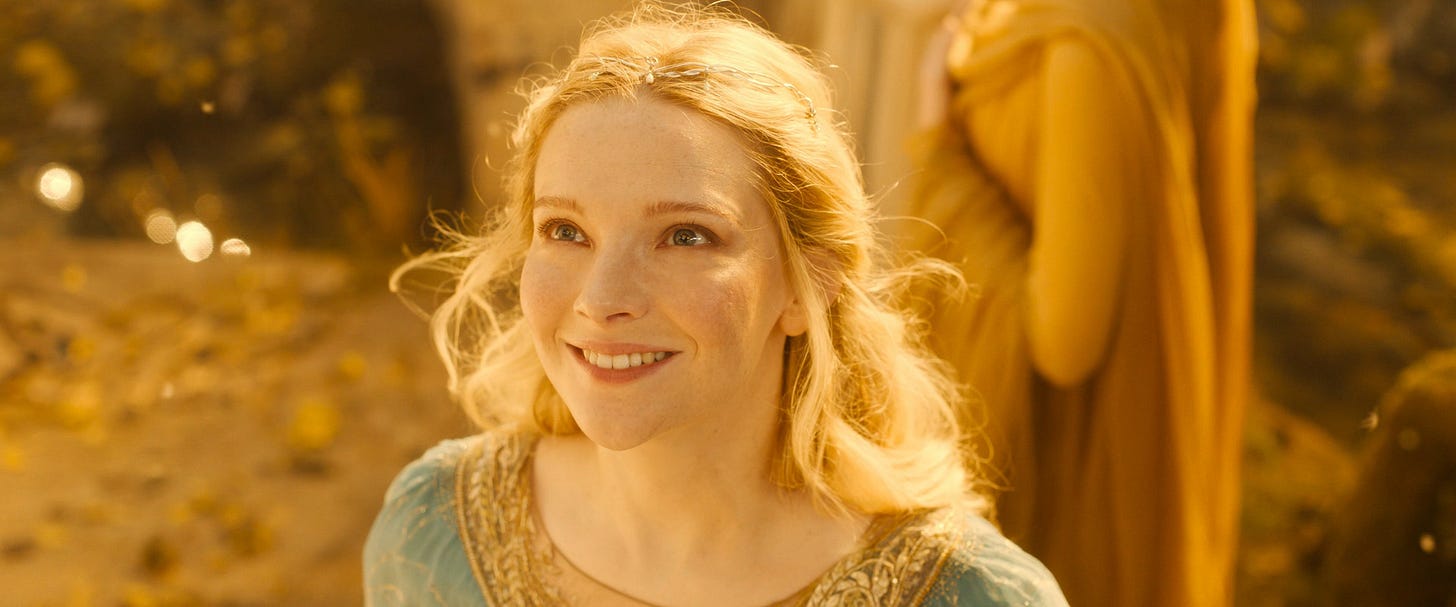
But thankfully, not all the Elves have been duped by Sauron. Or, to be precise, if they have, it will never happen again. I am speaking, of course, of Galadriel, once again played to perfection by Morfydd Clark. I am so happy that, although the focus has shifted somewhat to Sauron’s rise to power and his seduction of Celebrimbor, she is still a major character. Her trials last season, some of them self-inflicted as she struggled through her pride and single-mindedness and sense of urgency, would probably have broken a lesser individual, but they have made her stronger. She is still very much driven and resolved, fully committed to the fight, but now she has learned a new humility and patience; she is far more willing now to talk to others, to heed good counsel, to suggest where she would in the past have commanded, and to bide her time and accept the judgement of others. And she is not powerless in the face of the Enemy. Sauron did breach her mind in the finale of Season 1, but he did not corrupt her heart or her soul, and she did ultimately throw him out not only of her mind but also of Eregion. His plan to make two circular objects with which to dominate the Elves was turned on its head when Galadriel proposed that Three Rings be made instead; it was a bit of a close call, but in one of the most beautiful sequences of the whole show, the Three are put to good use, healing the Great Tree of Lindon and giving the Elves a breathing space to prepare to counter Sauron. And for this, Galadriel deserves a lot of credit.
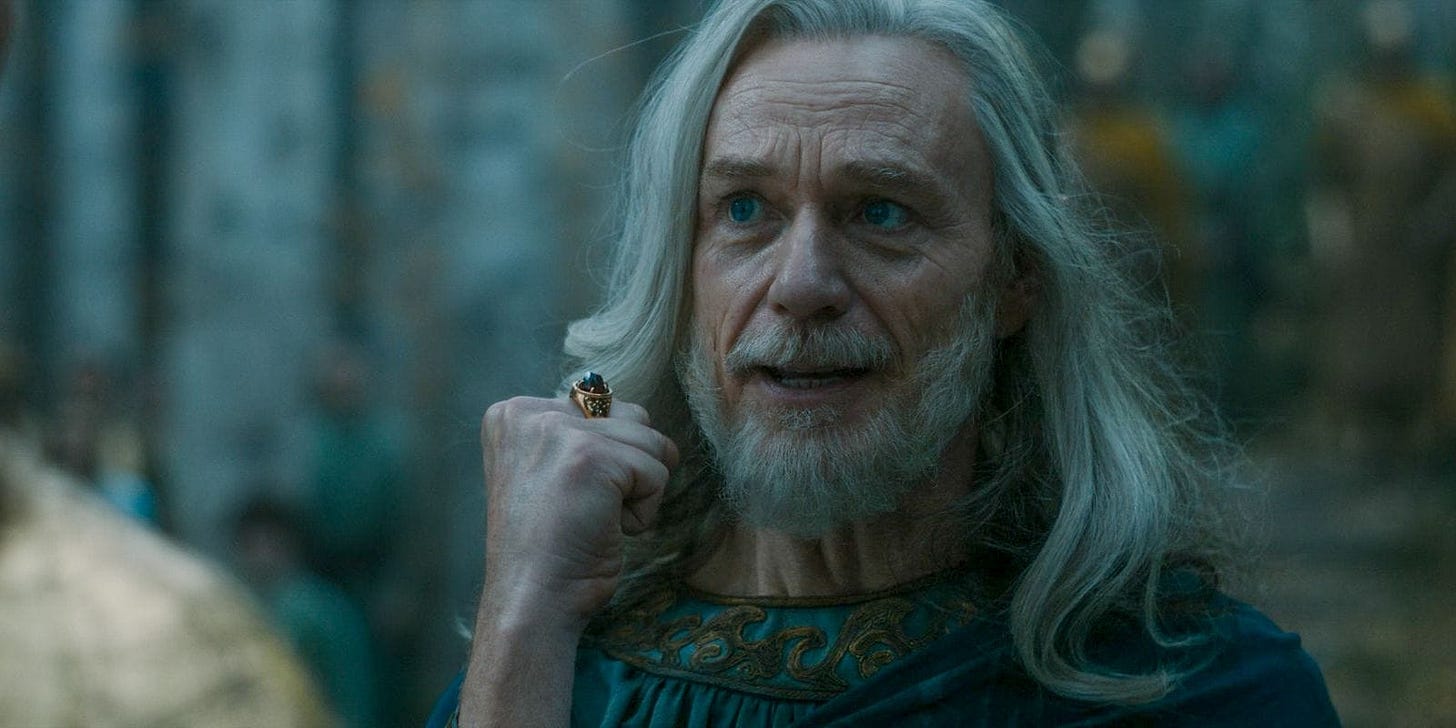
Why do I say that it was a “close call?” Well, if you remember from the Season 1 finale, in her grief and shock and urgency in the wake of unmasking Sauron, Galadriel had not been forthcoming with Halbrand’s true identity even while she insisted that he never be welcomed or treated with ever again. Elrond (Robert Aramayo) had immediately gotten suspicious and went snooping, and thus found out half the truth for himself; and the full revelation to High King Gil-galad (Benjamin Walker) tipped him into full paranoia. If he’d had his way, the Three would have been destroyed, or cast deep into the sea. That they weren’t is thanks to newcomer Cirdan (Ben Daniels), a master shipbuilder and mariner and, like Galadriel, a veteran of the Elder Days. He is something of a scene-stealer, and I love him so much. He is so soft and wise and calm, full of the peace that comes with long years, powerful insights about the past, and good counsel for both his old protege Gil-galad and his new one Elrond. If he'd been around last season, I bet Galadriel would never have been sent off on that ship in the pilot, a decision which ended up causing so many problems. With that in mind, the person most responsible for that decision, Gil-galad, comes off much better this time than last season. While he's still keeping Galadriel on something of a leash, he is actually willing to talk to her, to trust her, and to listen to her and to confide in her, both as the Commander of the Northern Armies and as a fellow bearer of a Ring of Power. If he'd been like this last season, a lot of problems would have been avoided; thus far, he has made some real progress toward redressing the justifiable dismay that many fans greeted him with last time.
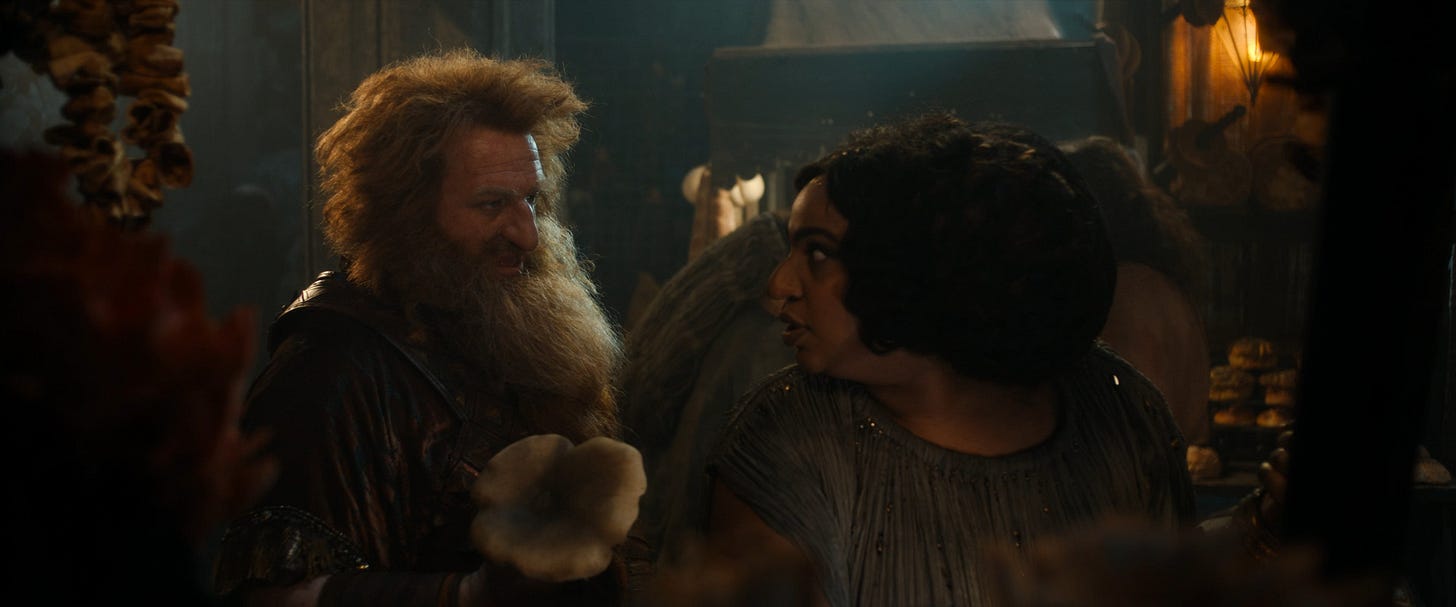
Gil-galad isn’t the only king who is softening in the face of trouble. When we last left Khazad-Dum, King Durin III (Peter Mullan) had just had a fierce falling out with his heir, also named Durin (Owain Arthur) over the former’s unwillingness to help the Elves “cheat death”, which had resulted in the latter being disinherited. Princess Disa (Sophia Nomvete) has taken the disinheritance rather well and has recovered from her Lady Macbeth phase from the penultimate episode last season, but she knows that all will not be well until her husband and father-in-law find some way to make amends. Her efforts initially don’t bear fruit, until a landslide high up in the mountains—perhaps triggered by the eruption of Mount Doom far to the south, although geography would argue against it—puts the entire delicate Dwarven ecosystem in peril. Somehow, a certain fair person learns of this, and an elegant invitation arrives from Eregion to discuss how magic rings might be able to help the dwarves out of their predicament. Durin the Younger, playing the role that many people wrongly ascribe to Galadriel in Unfinished Tales (as a way of dissing Galadriel in the show) immediately smells a rat, and argues strongly against taking Annatar and Celebrimbor’s offer; in this he is unsuccessful, as both Disa and the King are desperate enough to try anything that will ensure their people can eat. But at least the two Durins are talking now, and their reconciliation is gruffly touching in a way only Dwarves can manage; too bad, as we know from the trailers, that it won’t last.
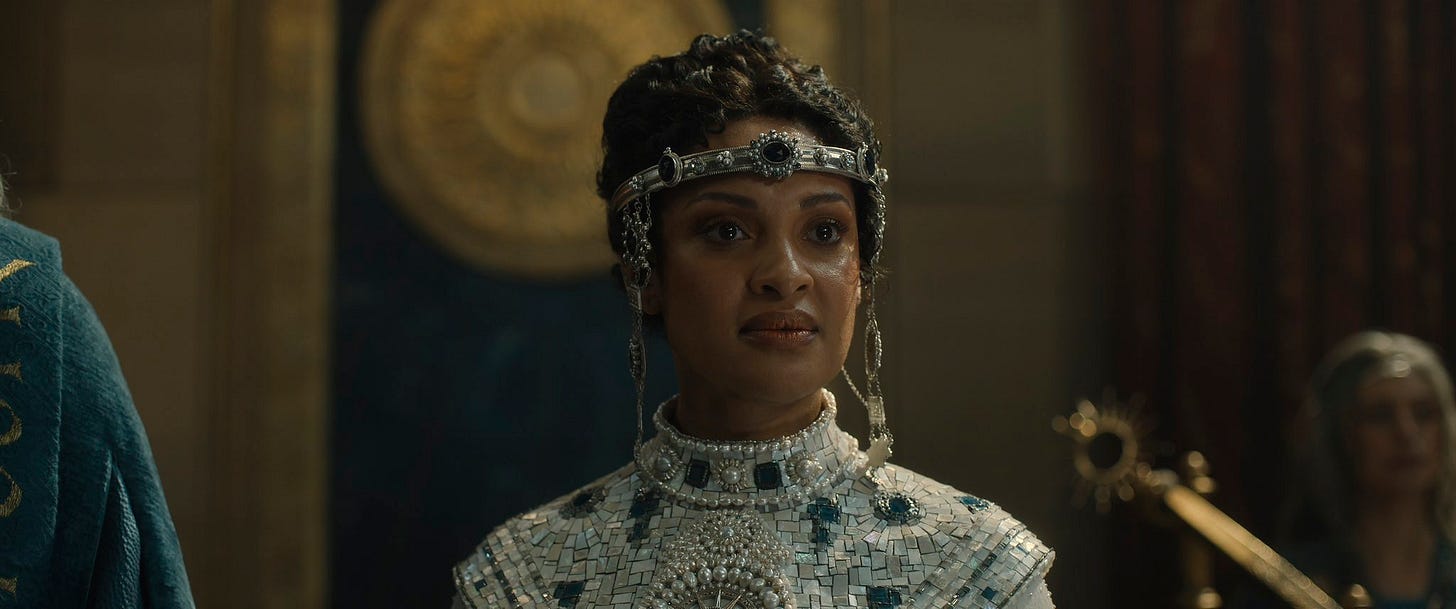
The outcome of the eruption of Mount Doom and the creation of Mordor is also felt far across the sea, in the island kingdom of Numenor. Princess-Regent Miriel (Cynthia Addai-Robinson) is now Queen, for while she was away leading her military expedition to the Southlands her father, King Tar-Palantir, died after a long illness. That expedition ending in defeat and loss clouds her reign before it even begins, as many in Numenor, grieving their losses, raise their voices against Miriel and in favor of the bona-fide Numenorean nationalist Pharazon (Trystan Gravelle), her cousin who absolutely would never do something like go to war on behalf of an Elf. Two people in particular lead the campaign for him; Will Keen’s Lord Belzagar is something of a plot device, but Ema Horvath’s Earien, grieving for the loss of her brother Isildur (Maxim Baldry) is fast growing into an actual character with agency of her own; coming after she was something of a cipher last season, it’s good to see her finally justifying her existence in the show, even if she’s ultimately going to go down a very dark path. And the tragic thing for Earien is…even as she invokes her brother’s name in Numenor’s civil strife, said brother is actually alive and well. It’s a bit of a close call, since he somehow ended up in the larder of the monstrous spider Shelob (a bit smaller than we remember her from The Two Towers, but still dangerous and with an army of facehugging babies), but he got out thanks to his faithful horse Berek being something of a badass. And thanks to not being sucked dry by a spider, Isildur finally gets the chance to grow as a character himself. I loved how he and new friend Estrid (Nia Towle) were arguing like an old married couple after just knowing each other for a few seconds. Perhaps because he misses his canonical little brother Anarion (mentioned by name last season, but still absent), he steps in to be one for a grieving Theo (Tyroe Mufahudin). And how he's been carrying the grief of how his mother drowned saving him for all these years? That explains so much about how he was screwing up at everything he tried in Numenor; nothing could fulfill his dream of doing something “singular” that would prove that his mother didn’t die in vain.
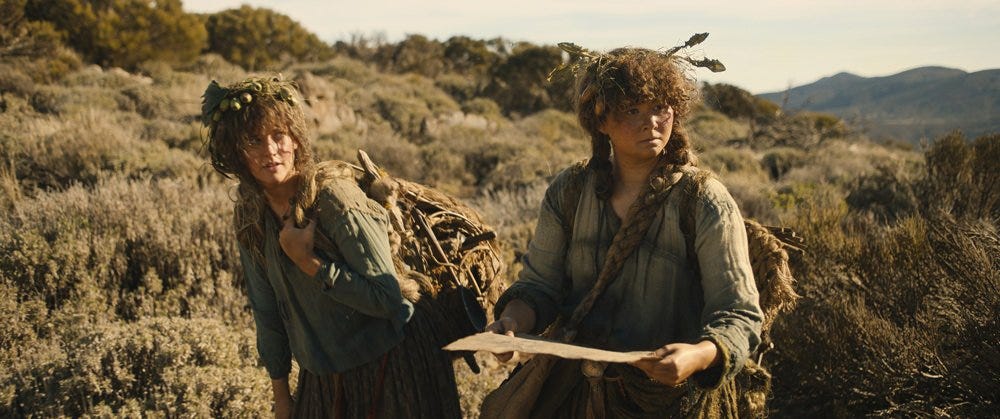
What else? Oh yes, the Stranger (Daniel Weyman) and Nori (Markella Kavenagh) are off on their quest to Rhun to find out who exactly he is, since all they know for sure is that he is at least a Chaotic Good. Ultimately Lawful Good, but he’s still having some difficulty controlling his powers, so whenever he tries to tap into them, shenanigans ensue. One power he, and Nori, don’t have is a good sense of direction; this ends up working in their favor because they go in circles until they unexpectedly are joined by Nori’s BFF Poppy (Megan Richards), who is a good map-reader. And they make good progress, in the process having many funny and endearing conversations. This is a huge improvement from last season, where the Stranger had not yet mastered speech; here he has, and thus can hold his own against Nori. And it’s good that the three amigos have each other, since the further east they go the deeper they go into truly dangerous territory, ruled by a mysterious dark wizard (Ciaran Hinds) of shady but still evil motivations, with a whole coven of mystical sorcerers and Easterling mercenaries at his beck and call. At one point the Stranger has no choice but to grab a staff like Gandalf (by now, there’s like a 90% chance that he is indeed Gandalf in his pre-Third Age guise of Olorin) and call upon the power of earth and air to save them from said mercenaries; they are swept away by a sandstorm, but so are Nori and Poppy. Not great; the Stranger desperately needs to rescue his friends, and find some way to master his powers and channel them for the greater good.
So, a lot has happened in these three episodes. How has it been executed? I’ve done my best to allude here and there to my thoughts on the execution, but in case it hasn’t been clear…for the most part, the execution has been excellent.
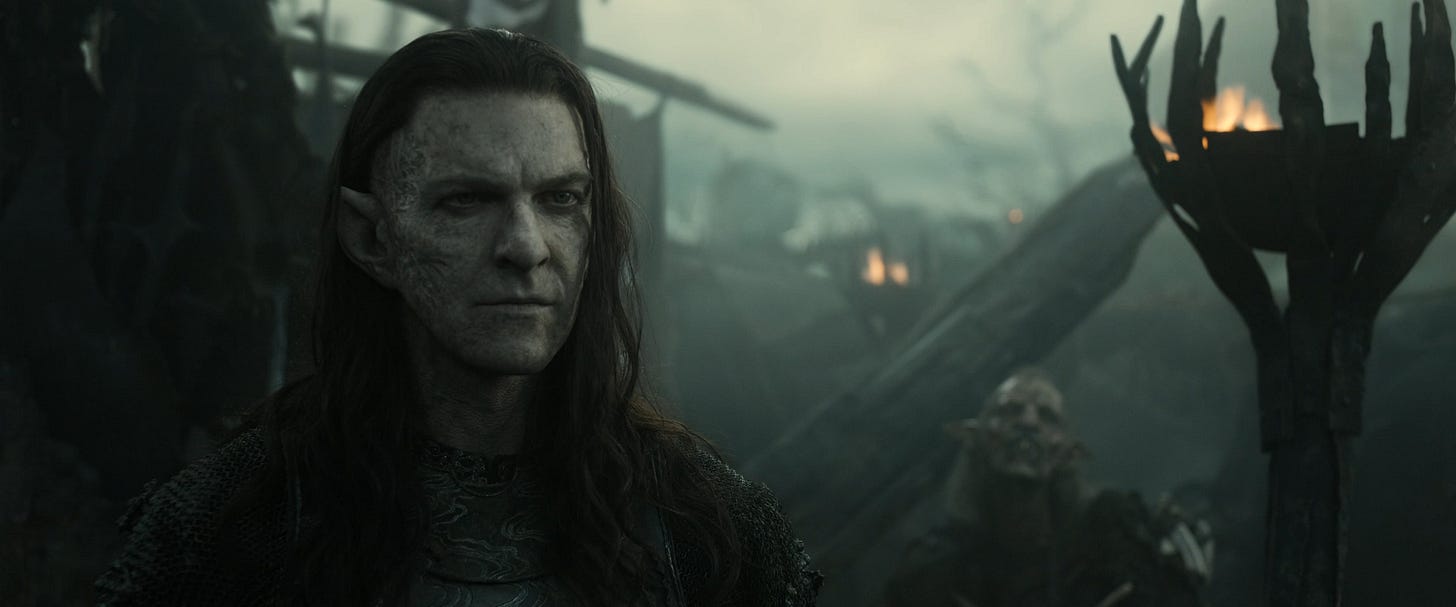
Everyone is acting to top form, just like last time, although this time there actually are a few standouts. Everyone talks about Charlie Vickers, Charles Edwards, Sam Hazeldine, Ben Daniels, Maxim Baldry, Owain Arthur and Sophia Nomvete; I would also add Morfydd continuing to be perfect as Galadriel, building upon her great work last season and adding to it, and Daniel Weyman actually being able to talk this time. Even one actor who didn’t return is treated with respect and poignancy, as Nazanin Boniadi’s Bronwyn is given a heartfelt and plausible sendoff; I can easily believe she succumbed to a secondary infection from her wound, especially since she probably worked herself too hard caring for everyone else. They are well served by the script and the story, which are indeed on much firmer footing this time as showrunners JD Payne and Patrick McCay bring more experience, and tackle a story for which they actually have an outline in the source material. The production design and visuals remain excellent, indeed improved from last time; with more life and bustle surrounding our main characters in Khazad-Dum, Lindon and Eregion, Middle-earth feels like an actual populated world, something we only really saw last season in Numenor and to a lesser extend the Southlands. Bear McCreary’s score continues to delight, and in this pilot alone we have the added pleasure of hearing not only Sophia sing as she pleas to the rocks again (unsuccessfully this time), but also Benjamin Walker as he sings a heartfelt lament for the Fading of the Elves, when he thinks they have no choice to leave Middle-earth.
And although we are only three episodes in, the show continues to embrace and engage with Tolkien’s themes. Elrond and Galadriel’s parting-of-ways over the use and purity of the Rings is hard to watch, but it is a helpful and textual visualization of the grayness of the Three; how they were susceptible to Sauron’s influence and also a tool for the Elves to unnaturally combat their own fading and maintain themselves as kings in Middle-earth, but how they were also pure of his touch and outright domination and could be, indeed were, used for the greater good. As they have their own personal struggles with the Rings, Cirdan and Galadriel end up proving the point that although there is a Divine plan, free will is a thing, and it’s important how we use it; Pharazon ends up doing the same thing when Miriel’s coronation turns ugly but is suddenly graced by a mighty Eagle, probably from Manwe himself, although his choice has a more negative outcome than theirs. There has been something of an uproar over a brief scene where the Orc captain Glug (Robert Strange) has an unexpectedly tender moment with what appears to be his wife and baby; but far from a revisionist attempt to make Orcs more heroic, this is merely part of how the show continues Tolkien’s own struggle with the nature of Orcs: were they merely soulless creatures of slime, or were they actual sentient beings tragically twisted into the service of darkness? Even Sauron, before his transformation from Halbrand to Annatar in the second episode, has a chance to tap into what Tolkien wrote about Sauron’s struggles to assume the leadership of Morgoth’s servants, and his own “dark grayness” as a character growing into the Dark Lord.
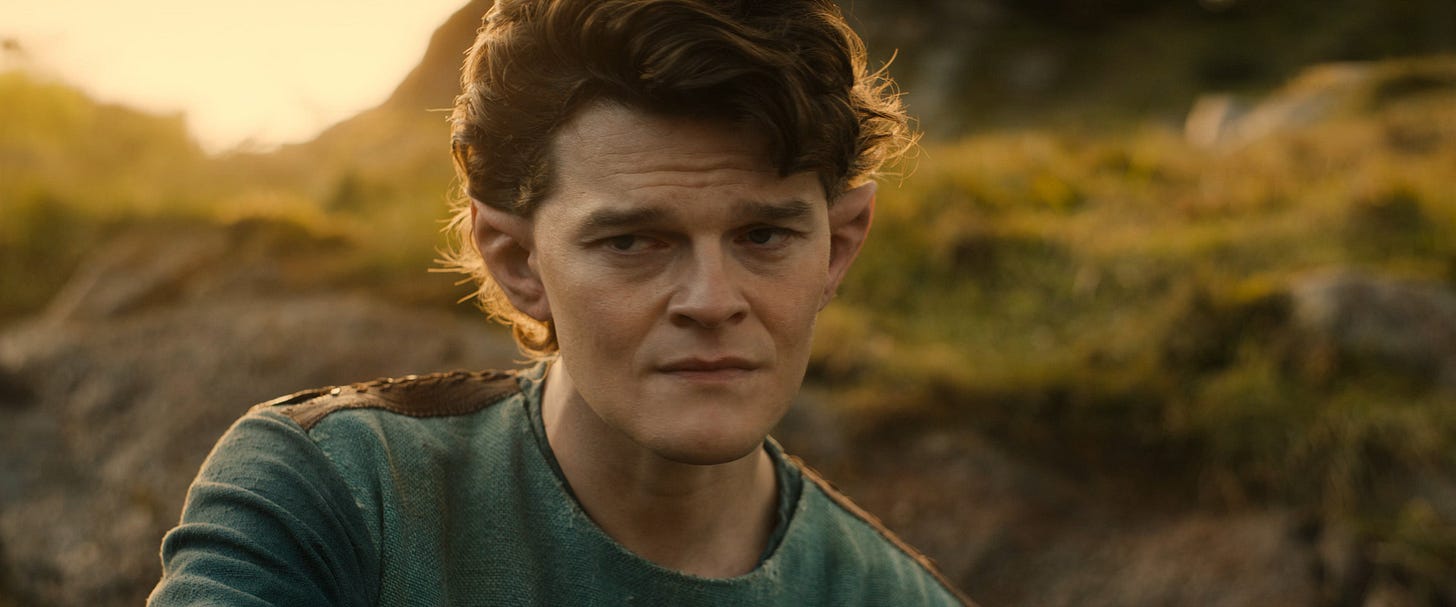
Not everything works for me. For example…I am really not a fan of how Elrond reacts to everything that is going on. He's not exactly wrong to be wary of the Rings, the Elves did take them off and hide them as soon as Sauron forged the One after all. But he's being premature in his fear; Sauron doesn't have a Ring of his own, and that's mostly because Galadriel rejected his plan of making Two when she rejected him, and she drove him out of Eregion before he could touch the Three. As it stands now, the Three are good and pure and can be used safely. But more problematic to me is how bitter, sometimes even cruel, Elrond is to Galadriel. I get that he feels betrayed by her, but to an extent his actions—grabbing the Three and bolting, refusing to consider even the possibility that they were never touched by Sauron, going out of his way to accuse Galadriel of willfully choosing the darkness and of knowingly collaborating with Sauron's return—are somewhat vindicating her in her impulse decision to withhold the truth of Halbrand's identity. And the way he seems to be actively trying to cut her deeply, in places where we know (even if he doesn’t) she is still vulnerable after Sauron’s emotional abuse in the Season 1 finale… It's really out of character for Mr. Kind as Summer, who was so good last season at speaking truth to power without coming off as a total ass. And I hope his character arc will involve some growth in humility on his part, trust, and mercy towards Galadriel, coming to accept that her heart and her intentions were still good and pure even if her execution was a bit sloppy. Because at this point he is proud and inflexible, and thus is honestly painting a target on himself that Someone might be able to exploit.
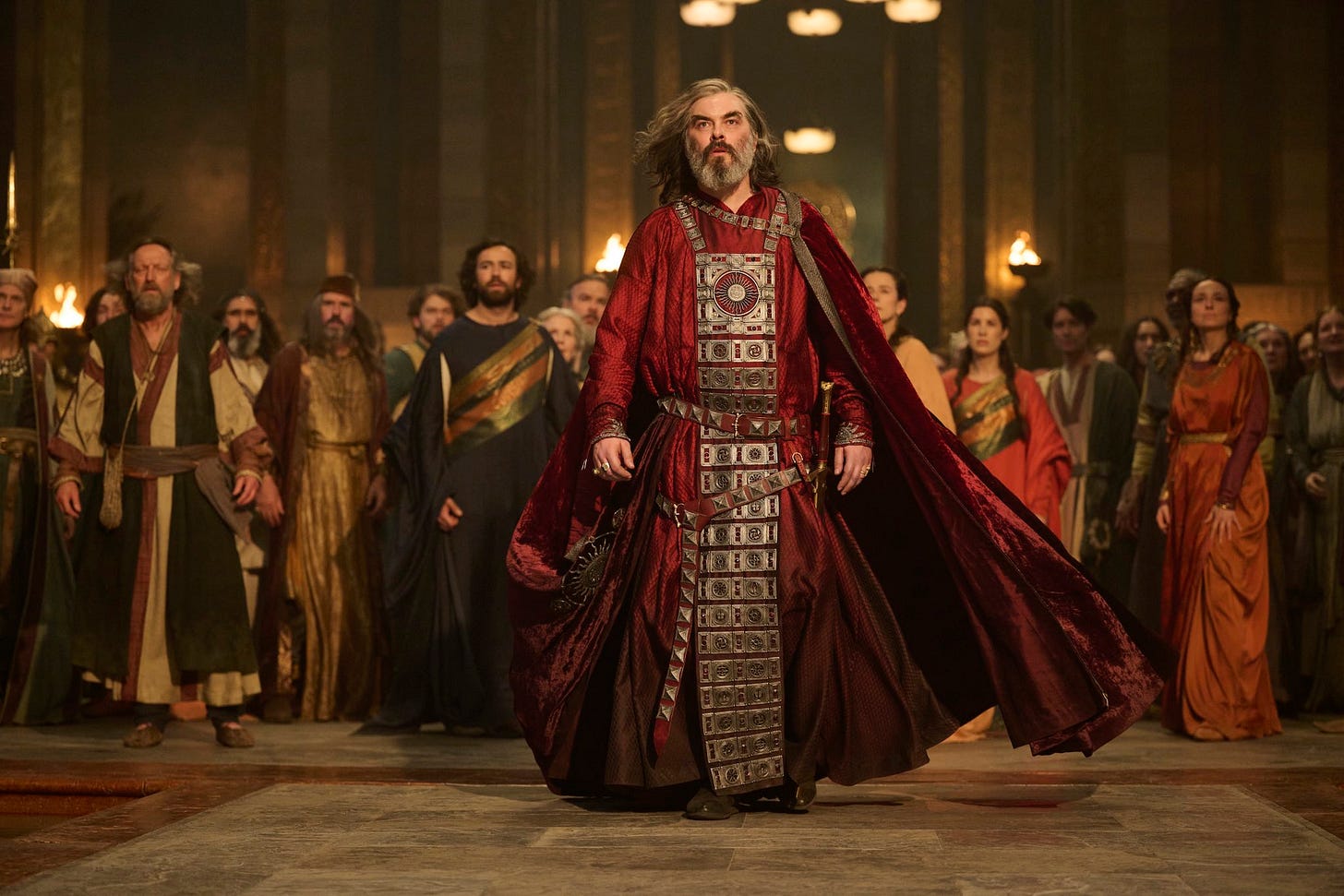
But at least Elrond is still a character in the story, with agency and clear motives. The same can’t be said for everyone. Arondir (Ismael Cruz-Cordova) has a cool action sequence saving Isildur and Estrid from some bad men, and a couple of tender moments with Isildur and Theo, but for the most part he just…exists, in preparation for leaving Pelargir and fighting in the Siege of Eregion. But at least he is allowed to do something; in Numenor, while we understand clearly where Miriel, Pharazon and Earien are coming from, Elendil so far is limited to being a glorified seeing-eye dog, except for one scene where the Palantir yeets him across the floor. And the fact that Will Kean’s Belzegar and William Chubb’s “High Priest” are basically just plot devices is starting to make me understand why Amazon has been so cagey about letting many of the new actors out into the sunlight. Which makes me concerned about how Narvi (Kevin Eldon) and “Mirdania” (Amelia Kenworthy) are going to be handled, since the former in lore was almost as close a colleague of Celebrimbor as Elrond and Prince Durin are in the show, while the latter so closely resembles Galadriel even down to her costume, it has to be intentional; but so far, we have nothing to go on for either of them. And the short-changing of some characters does carry over a few times to other aspects of the show. While the Numenor storyline has some quality substance, it’s execution felt a little rushed and truncated. Pharazon's minions twisting the arrival of Manwe's herald in his favor could have slapped harder if the story, especially Miriel and Pharazon and their internal struggles, had had more time to simmer this season. As endearing as it is to see Berek rescuing Isildur, that whole storyline leaves me some...questions about the geography of Mordor, since he doesn’t seem to be climbing mountains in order to save his human. And how exactly does the timeline work? It seems that the Isildur/Berek storyline takes place over a few days, but things in Lindon and Eregion are happening over the course of a few weeks…simultaneously. Indeed the season kind of starts off like this; while Adar’s assassination of Sauron is vivid and brutal to watch, it happens somewhat differently than how Adar described it to Galadriel in Season 1, and moreover we see no evidence of the dark experiments in sorcery that triggered this coup and whose detritus Galadriel discovers for herself in the Pilot of Season 1.
But overall, I am absolutely not going to let my differences with this pilot hinder my enjoyment of the rest of the premiere. Even Elrond’s hardness will almost certainly soften in time; we do still have five episodes, after all. This premiere has done what it is supposed to: reintroduce us to this world, set the stage for this season’s story, and get us excited for it. All of these have been done, and done well. I look forward to the rest of this season playing out, and being able to talk about it with all of you. Thank you all for your patience, especially if you’ve made it this far (to imagine that I at one point was worried I wouldn’t be able to find enough words to justify a full essay!”); hopefully the next several essays will be shorter, since they’ll be covering individual episodes rather than three. But hopefully the rest of the season will be as meaty and thought-provoking as these three; and honestly, I’m fairly confident that will be the case.
All images ©2024, Amazon Studios, unless otherwise indicated.
For Further Reference
Felicia Day, “Inside the Rings of Power”
—Inside the Rings of Power: S2, E1”
—“Inside the Rings of Power: S2, E2”
—“Inside the Rings of Power: S2, E3”
Esquire, “Charlie Vickers Breaks Down the Rings of Power Season 2 Scenes and Halbrand’s New Look”
Jolkien with Tolkien, “Choosing Your Path, Finding Your Name, and Reversing Fortunes: The Rings of Power Season 2, Episodes 1-3 Review and Analysis”
Nerd of the Rings, “Rings of Power Season 2, Episode 1 Breakdown”
— “Rings of Power Season 2, Episode 2 Breakdown”
— “Rings of Power Season 2, Episode 3 Breakdown”
Tea With Tolkien, “The Rings of Power: Season 2 Breakdown and Reaction”
Thank you for reading The Tales That Really Matter. Please feel free to check out our Facebook, Instagram, Threads and Substack Notes profiles as well, that way we can continue to grow and reach more minds and hearts 😊




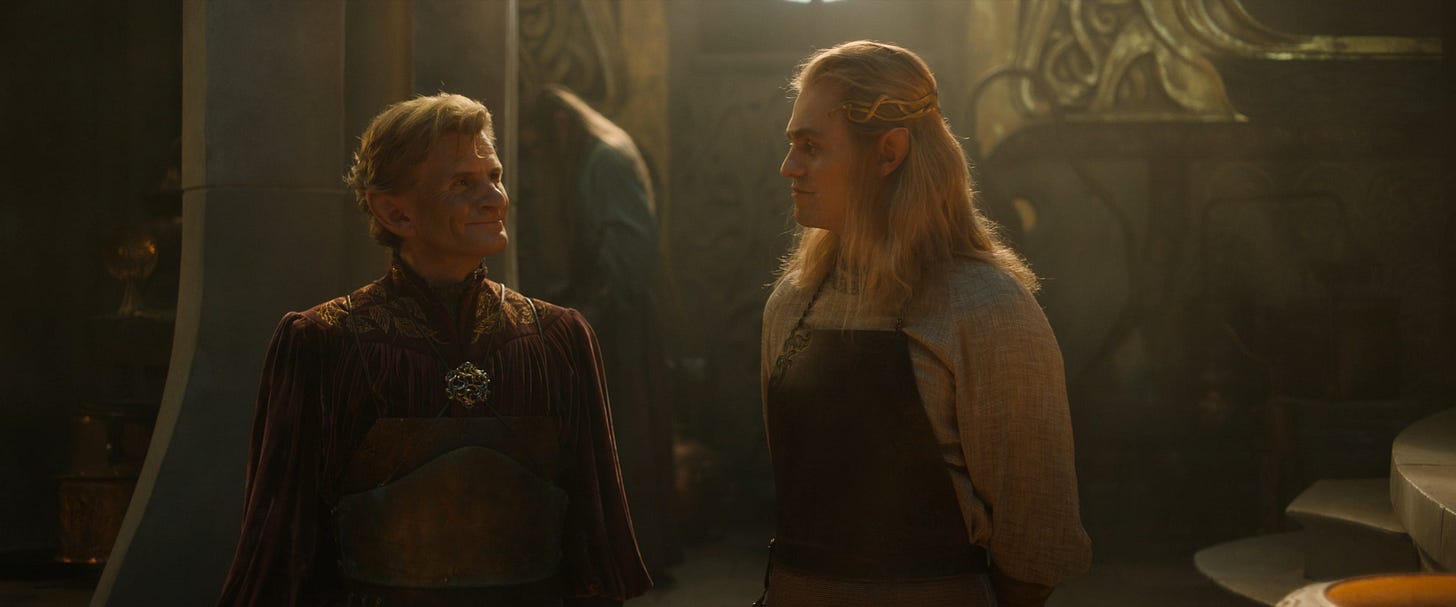
Fun fact!: during the great earthquakes of 1811-1812 in New Madrid, Missouri and the surrounding area, shaking was felt as far away as Boston, MA (~1200 miles away) and the Caribbean. :) I'll give Mordor shaking all the way to Khazad-dûm (with magical influences) a pass.